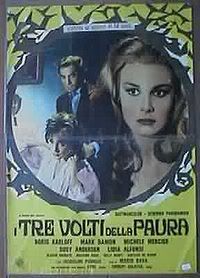
"Black Sabbath" is one of the perfect reminders as to why Boris Karloff was an icon (and still is) in the horror genre. Sure, he achieved infamy though his depiction of Frankenstein's monster, but I appreciate him more for the roles that are often overlooked. "Comedy of Terrors" and "The Raven" are great examples of what Karloff can do with comedic material. And when it comes to serious roles with a hint of the sinister, "The Black Room" is a prime example of his acting expertise; Karloff plays twin brothers, and is always the case with twins, one is good and one is evil (his monologue regarding pears vs. apples is one I find myself uttering aloud every time I bite into the aforementioned fruit).
While a trilogy anthology, the middle tale, "The Wurdalak," is the one that stands out the most. Karloff returns home after beheading the wurdalak that had been terrorizing the 19th century Russian back country and soon, his family begins to worry that he might be turning into the flesh-eating creature as well. The tale grows darker and darker as Karloff's Grocha kidnaps his own grandson, tears his throat out with his teeth and the grandson shows up later to lure his parents out of their home into danger. The lighting is brilliantly atmospheric and the sets and production are reminiscent (appropriately so) of Roger Corman's adaptations of Edgar Allen Poe pieces. Karloff grows more and more terrifying as Grocha continues to decay on screen, accentuated by bottom lighting and proper shadowing on his makeup (see below).

The other two tales are entertaining yarns, but rarely evoke the atmosphere of the longer, plot-driven "Wurdalak." The first, "The Telephone," is a fairly predictable piece about a girl being terrified by repeat calls from a spurned lover threatening to kill her. Sadly, the ending is a little cliched. The final tale, "The Drop of Water" is a pleasantly eerie piece about a woman quietly suffering from delusions and paranoia within the confines of her apartment after stealing a priceless ring from the finger of a recently deceased medium. The film's only true downfall is ending the trilogy with Karloff out of character, breaking the fourth wall as he talks to the audience, and then ending on a lighthearted and silly note. As a result, the ominous tone of the film is lifted - a gesture that some might find pleasant, but I found highly unnecessary and slightly betraying.
Watch the Trailer

No comments:
Post a Comment